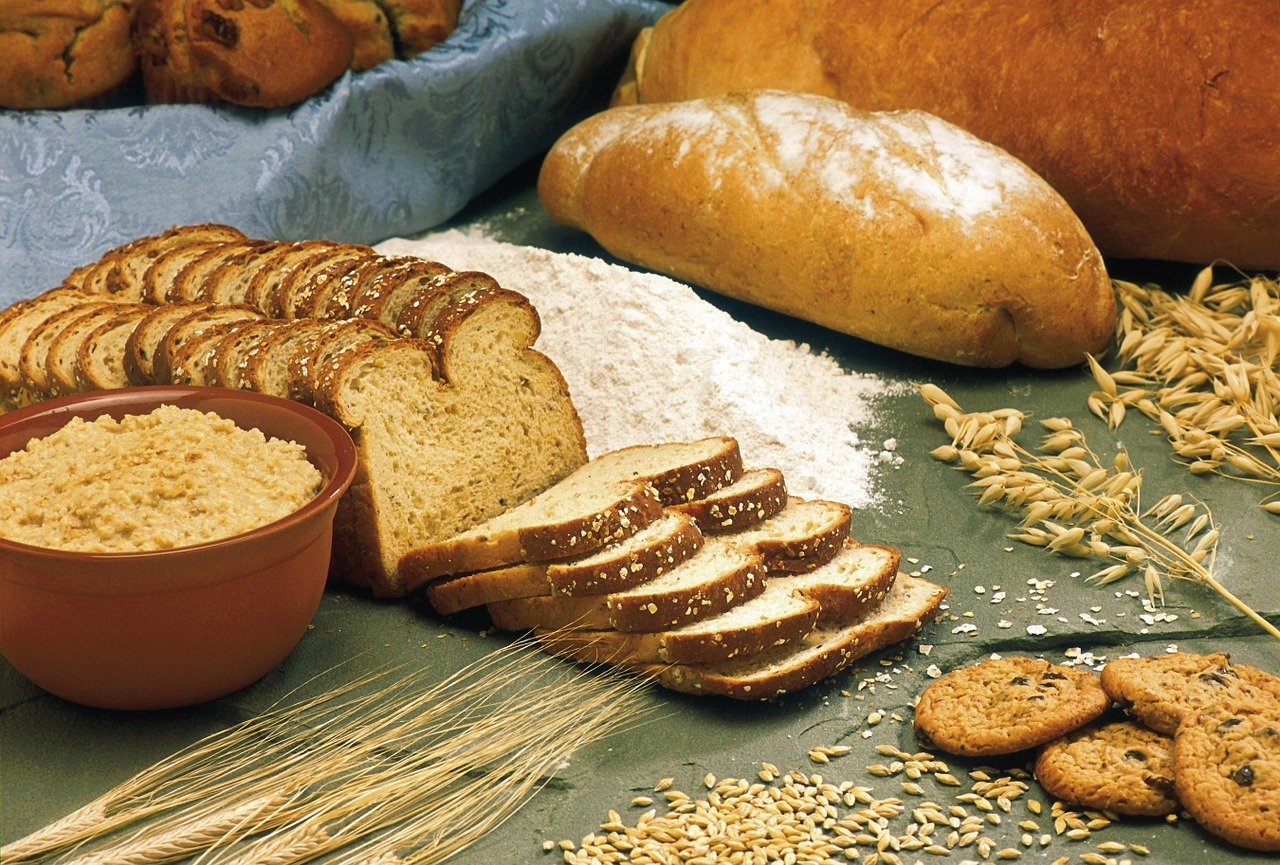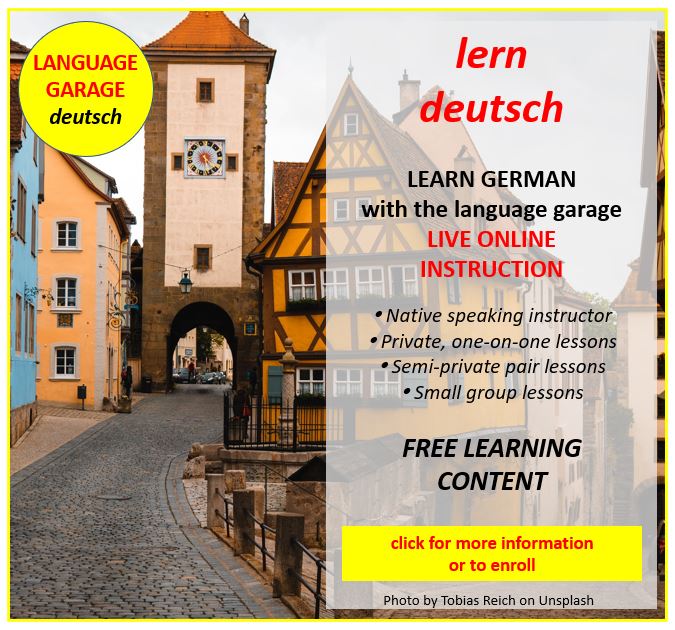Essen: Basic German Food Vocabulary
In this post we’ll build your German vocabulary by learning about everyone’s favorite language topic: German food terms! German food vocabulary will come in handy no matter why you’re learning German. First we’ll cover some basic expressions related to food. Then we’ll look at vocabulary for meals. Next we’ll see a lot of basic German vocabulary for food and drink. Finally, we’ll wrap up with related vocabulary for utensils and ways to describe your food. Let’s dig in.
Ich habe hunger! I’m hungry
Let’s start to build your German vocabulary by learning some expressions that you’ll probably need to know that are related to German food vocabulary.
- Ich habe hunger!
I’m hungry - Ich habe Durst.
I’m thirsty.
- Ich möchte etwas zu essen.
I want something to eat. - Ich möchte etwas zu trinken.
I want something to drink. - Ich habe Lust auf einen Snack.
I feel like a snack.
Was gibt’s zum Frühstück? What’s for breakfast?
You probably want to know how to talk about meals when you’re using German food terms. The meals in German are: das Frühstück breakfast, das Mittagessen lunch, das Abendessen/ Abendbrot dinner, ein Snack a snack, der Nachtisch dessert. Let’s put that German vocabulary to work in some practical examples.
- Was gibt’s zum Frühstück?
What’s for breakfast? - Was gibt’s zum Mittagessen?
What’s for lunch? - Was gibt’s zum Abendessen?
What’s for dinner? - Was gibt’s als Nachtisch?
What’s for dessert? - Ich frühstücke früh.
I eat breakfast early. - Ich esse mit Mitarbeitern/Mitarbeiterinnen zu Mittag.
I eat lunch with colleagues. - Ich esse mit meiner Familie zu Abend.
I eat dinner with my family.
Was isst du? What are you eating?
Now let’s see some basic German vocabulary related to foods and beverages. We’ll divide these German food terms into sections.
German Food Vocabulary: Carbs and Protein
- das Brot, -e bread
- der Reis rice
- die Pasta/Teigwaren pasta
- die Nudel, -n noodles
- das Fleisch meat
- das Huhn, -¨er chicken
- das Rind(fleisch) beef
- das Schweinefleisch pork
- der Schinken ham
- das Lamm, -¨er lamb
- der Tofu tofu
- der Fisch, -e fish
- die Meeresfrüchte seafood
- die Garnelen shrimp
- die Krabbe, -n crab
- die Muschel, -n clam
- der Hummer, – lobster
- die Auster, -n oyster
- die Tintenfische squid
More German Food Vocabulary: Vegetables, Fruit, Dairy
- das Gemüse vegetables
- die Tomate, -n tomato
- die Zwiebel, -n onion
- der Knoblauch garlic
- der Salat lettuce
- der Spinat spinach
- der Spargel asparagus
- der Kohl cabbage
- der Pilz, -e/der Champignon, -s mushroom
- die Salatgurke, -n cucumber
- die Paprikaschote, -n pepper (as in bell)
- die Chilischote, -n chili pepper
- die Frucht, -¨e fruit
- der Apfel, -¨Ø apple
- die Birne, -n pear
- der Pfirsich, -e peach
- die Orange, -n/die Apfelsine, -n orange
- die Zitrone, -n lemon
- die Weintraube, -n grape
- die Erdbeere, -n strawberry
- die Banane, -n banana
- die Nuss, -¨e nut
- die Erdnuss, -¨e peanut
- der Samen, -Ø seed
- der Weizen wheat
- die Frühstücksflocken cereal
- das Salz salt
- der Pfeffer pepper
- der Sesam sesame
- der Honig honey
- der Zucker sugar
- die Sojasauce soy sauce
- das Ei, -er egg
- die Milch milk
- der Käse cheese
- die Butter butter
German Food Terms for Drinks, Sweets, and More
- das Wasser water
- der Tee, -s tea
- der Kaffee coffee
- der Wein, -e wine
- das Bier, -e beer
- die Sojamilch soy milk
- der Saft juice
- die Eiskrem ice cream
- der Kuchen, -Ø cake
- die Torte, -n pie
- das Plätzchen, -Ø cookie
- die Süßigkeit, -en candy
- essen (ich esse, du isst) to eat
- trinken to drink
- kochen to cook
- probieren to taste
- Ich esse viel Reis.
I eat a lot of rice. - Trinkst du morgens Tee oder Kaffee?
Do you drink tea or coffee in the morning? - Du kochst echt gut!
You cook very well!
Eine Serviette, bitte. A napkin, please.
Now that you know some basic German food vocabulary, let’s see some phrases that will come in handy when you’re ordering food. Some vocabulary related to German food terms is: der Teller, -Ø plate;die Schüssel, -n bowl; das Messer, -Ø knife; der Löffel, -Ø spoon; die Gabel, -n fork; das Essstäbchen, -Ø chopstick; die Tasse, -n cup; das Glas, -¨er glass; die Serviette, -n napkin.
- Könnte ich eine Serviette/eine Gabel/ein Messer/einen Löffel/Essstäbchen bekommen?
Could I have a napkin/fork/knife/spoon/chopsticks? - Könnte ich ein Glas Wasser bekommen?
Could I have a glass of water? - Wo sind die Gabeln, Messer und Löffel?
Where are the forks, knives, and spoons? - Die Gabeln, Messer und Löffel sind in der Schublade.
The forks, knives, and spoons are in the drawer. - Die sauberen Gläser sind im Küchenschrank.
The clean glasses are in the cabinet. - Die Kaffeetassen stehen im Regal.
The coffee cups are on the shelf. - Könnte ich bitte eine Serviette haben?
Could I have a napkin, please?
Wie schmeckt es Ihnen? How’s your food?
Let’s close with some German vocabulary that you can use to talk about your food: köstlich delicious; salzig salty; süß sweet; bitter bitter; sauer sour.
- Es ist köstlich.
It’s delicious. - Es ist sehr gut.
It’s great. - Das Essen ist vorzüglich.
This food is excellent. - Es ist zu heiß.
It’s too hot. - Es ist zu kalt.
It’s too cold. - Es ist zu süß.
It’s too sweet. - Es ist zu salzig.
It’s too salty. - Es schmeckt zu fade.
It’s tasteless/bland. - Es ist zerkocht.
It’s overcooked. - Es ist nicht gar.
It’s undercooked. - Es ist ölig/fettig.
It’s oily/greasy.
Do you want to learn German?
We hope you’ve enjoyed growing your German vocabulary with some German food terms. If you want to learn more, check out our other posts on German language, culture, and more. And if you’re looking for convenient and affordable live German lessons with a real teacher, check out The Language Garage German. Our lessons are given online in a virtual classroom, so it doesn’t matter where you live or work. We can come to you. And we have flexible options, with a free trial so that you can decide if there’s a fit. Check us out!
Image: FotoshopTofs on Pixabay






